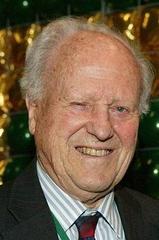Final Call for Papers
53rd New Zealand Association of Economists Annual Conference
To be held at the Palmerston North Convention Centre
27 June – 29 June 2012
Extended period for submission: Abstracts are now due by Wednesday, 4 April

Final Call for Papers
53rd New Zealand Association of Economists Annual Conference
To be held at the Palmerston North Convention Centre
27 June – 29 June 2012
Extended period for submission: Abstracts are now due by Wednesday, 4 April
 Sir Frank Holmes, a distinguished New Zealand economist and one of the founders of the New Zealand Association of Economists and the first editor of New Zealand Economic Papers, passed away on 23 October 2011. Sir Frank is the only person to be elected as both a Life Member and Distinguished Fellow of NZAE. More information on Sir Frank’s contribution to NZAE and the economics profession is available on our Life Members and Distinguished Fellows pages.
Sir Frank Holmes, a distinguished New Zealand economist and one of the founders of the New Zealand Association of Economists and the first editor of New Zealand Economic Papers, passed away on 23 October 2011. Sir Frank is the only person to be elected as both a Life Member and Distinguished Fellow of NZAE. More information on Sir Frank’s contribution to NZAE and the economics profession is available on our Life Members and Distinguished Fellows pages.
His obituary can be found in issue 42 of Asymmetric Information.
Applications are now being sought for the tenth A R Bergstrom Prize in Econometrics.
The objective of the Prize is to reward the achievement of excellence in econometrics, as evidenced by a research paper in any area of econometrics. The Prize is open to New Zealand citizens or permanent residents of New Zealand who, on the closing date of applications, have current or recent (i.e. within two years) student status for a higher degree. It is intended that the awardee will utilise the proceeds to assist in financing further study or research in econometrics in New Zealand or overseas.
The Prize can be awarded once every two years, with its value currently being $2000. The selection committee will consist of Professors P C B Phillips, V B Hall and their nominees.
Applications/nominations must include:
• a formal letter of application and, in the case of students, a letter of nomination by their research adviser or chairperson
• a research paper written by a single author, reporting original research in any area of econometrics
• a CV and relevant academic transcripts
Applications should be emailed or posted by 24 August 2012, to:
Professor V B Hall
School of Economics and Finance
Victoria University of Wellington
P O Box 600 Wellington
NEW ZEALAND
Email: viv.hall@vuw.ac.nz
The Prize is supported by funds generously provided by the following sponsors:
The New Zealand Association of Economists
The School of Business and Economics at the University of Auckland
The Department of Economics at the University of Canterbury
The Faculty of Commerce and Administration at Victoria University of Wellington
Lincoln University
The Economics Group, Commerce Division at Lincoln University
C R Wymer
A D Brownlie
R J Bowden
H A Fletcher
R H Court
J A & D E A Giles
Anonymous
V B Hall
D M Emanuel
K B Nowman
P C B Phillips
In addition, royalties from the Festschrift Volume Models, Methods and Applications of Econometrics: Essays in Honour of A.R. Bergstrom, P.C.B. Phillips (ed.) Blackwell, Cambridge MA and Oxford UK, 1993, and from A Continuous Time Econometric Model of the United Kingdom with Stochastic Trends, by Albert Rex Bergstrom and Khalid Ben Nowman, Cambridge University Press, 2007, are applied to support the prize.
The contents of New Zealand Economic Papers, Volume 45, Issue 3, December 2011 (available online or by subscription):
The 2010 A R Bergstrom Prize in Econometrics has been awarded to David Baqaee, PhD student, Harvard University, for his paper “Using Wavelets to Measure Core Inflation: the Case of New Zealand”. David’s paper was completed while employed as an Economic Analyst at the Reserve Bank of New Zealand.
It is a truism that Western economies face a demographic problem: more older people and fewer working-age people will mean a higher dependency ratio. This future problem, we are told, requires action now, Now, NOW! We must prepare for the future by raising the retirement age and reducing superannuation payments.
Except that the future is already here, and no one has pushed the panic button. Continue reading
Alex Tabarrok posted at Marginal Revolution about sticky wages. It’s an interesting bit of mathematics. I can see his point, that sticky wages for employed people can keep the labour market from adjusting. Because the unemployed are a minority of the labour force, even large reductions in the wages they are willing to accept have a small impact on the total wage bill.
My reaction to this bit
If all employed workers accepted a 5% pay cut (or if the government ordered such a cut) and the Fed kept targeting inflation, we’d experience rapid economic growth.
was, ‘What’s this “we” stuff?’. Continue reading
I’ve been turning this over in my head for weeks. Obviously, the economic/political problems in the US are one of biggest economic issues going, and I’ve not blogged about them. Part of the reason I haven’t is that it is very difficult to separate the political from the economic. Continue reading
NZIER (where I work) has just published a new Insight on the next steps for water policy. The Royal Society recently published an issues paper on ecosystem services. Natural capital and the value it creates for the economy is clearly topical. Continue reading
I generally stay out of tax debates. I don’t know the economic theories, and valid comparisons are difficult to make.
This comparison by Rodney Hide (via Kiwiblog) bothered me, however:
A business generates $100 a year. The going discount rate is 10 percent. The value of the business is $1,000. That’s if there’s no tax.
Introduce a tax of, say, 30 percent, and the business now yields only $70 a year. The business is worth only $700. The tax liability is capitalised into the value of the business. Continue reading
The 53rd Annual Conference will be held at the Convention Centre in Palmerston North on 27-29th June 2012 more
The 52nd Annual Conference was successfully held at the Amora Hotel in Wellington on 29th June to 1st July 2011. Details, including copies of papers, can be found at Conference 2011
The Jan Whitwell prize was awarded to Alex Olssen at the NZAE 2011 Conference.
From the University of Otago School of Business …
“An official book launch celebrating Emeritus Professor Lyall McLean’s “A History of Economics and the Development of Commerce Degrees at the University of Otago 1871-2009” took place last night in Council Chambers of the University of Otago.
Lyall’s book builds on the work undertaken by Emeritus Professor T.K. Cowan who in 1988 wrote “Commerce at Otago, 1912 – 1987”
…
In addition to the history of the School the book includes, as an appendix, the names of all 19000+ graduates, listed by departments and 100+ photographs including the professors, Deans, heads of departments and the first PhD graduates of each department, will be available for sale at the launch.
This book is available for purchase at University Book Shop.”
A History of Economics and the Development of Commerce Degrees at the University of Otago 1871-2009 by Lyall McLean
The annual NZIER Economics Award promotes and recognises excellence in economics of relevance to New Zealand. Nominations for the 2011 Award are now open. For further details visit www.nzier.org.nz/public-good/nzier-economics-award
Gary Hawke and Ralph Lattimore presented the paper History of NZAE 20 July 05 at the New Zealand Association of Economists Meetings, Christchurch, June 2005. The paper is work in progress, intended to stimulate input into a history of the first 50 years of the NZ Association of Economists which will be celebrated in 2009. If it is quoted, its preliminary nature should be respected. Hawke, Head of the School of Government, Victoria University of Wellington, Gary.Hawke@vuw.ac.nz, Lattimore, consulting economist, Hope, Ralph.Lattimore@xtra.co.nz. The authors acknowledge the valuable library assistance of Sarah Spring and advice from John Yeabsley.
 It is with great pleasure the Association honours Stuart Birks with the award of life membership of the NZ Association of Economists. Stuart arrived at Massey University in 1978, after a stint working in Israeli kibbutzims. He had a BA (Hons) from Essex and an Msc from London. A specialist in mathematical economics and econometrics, having studied under stalwarts like Michio Morishima, Amartya Sen, Frank Hahn, Meghnad Desai and William Gorman, among others, Stuart started increasingly to feel uneasy about the usefulness of the accepted methods and beliefs of economics generally and quantitative economics in particular. He switched to economic policy instead, using the tools of economic theory in a critical manner. Continue reading
It is with great pleasure the Association honours Stuart Birks with the award of life membership of the NZ Association of Economists. Stuart arrived at Massey University in 1978, after a stint working in Israeli kibbutzims. He had a BA (Hons) from Essex and an Msc from London. A specialist in mathematical economics and econometrics, having studied under stalwarts like Michio Morishima, Amartya Sen, Frank Hahn, Meghnad Desai and William Gorman, among others, Stuart started increasingly to feel uneasy about the usefulness of the accepted methods and beliefs of economics generally and quantitative economics in particular. He switched to economic policy instead, using the tools of economic theory in a critical manner. Continue reading
Tim Harford, columnist for the Financial Times and author a new book, Adapt, will be delivering the opening keynote address at the NZAE conference on 29 June in Wellington. The main idea (apparently – I’m waiting until the conference to buy a copy) is that we need to adapt through trial and error, rather than relying on experts to design grand solutions. Continue reading
Keith Rankin provides a review in Agenda, Volume 15, Number 2, 2008 of “A Biographical Dictionary of Australian and New Zealand Economists” edited by J. E. King. Some excerpts from the review …
” … a wonderful resource for anyone interested in the intellectual foundations of Australia and New Zealand
“For an Australian book, it is refreshing that many of the subjects are New Zealanders
“Those economists whose contributed to economic thought and/or policy on both sides of ‘the ditch’ (as New Zealanders call the Tasman Sea) were Robert Torrens, E. G. Wakefield, Henry Hayter, Timothy Coghlan, William Pember Reeves, R. F. Irvine, Douglas Copland, A. G. B. Fisher, Colin Clark, Colin Simkin and Richard Manning.
“I enjoyed Alex Millmow’s account of Douglas Copland, a New Zealander who was trained under the auspices of Sir James Hight’s ‘Canterbury School’, along with J. B. Condliffe. Both men went on to stellar global careers while retaining strong identities with their places of origin. Copland would undoubtedly have been one of New Zealand’s greatest economists had he not been ‘unsuccessful in securing a chair in New Zealand’.
“This is a book that belongs in all of Australasia’s academic, public service and metropolitan public libraries. It also belongs in many of our private libraries, as a reference work, and as a book to just dip into for a random snippet from our intellectual past.
The book is available for purchase from the publisher